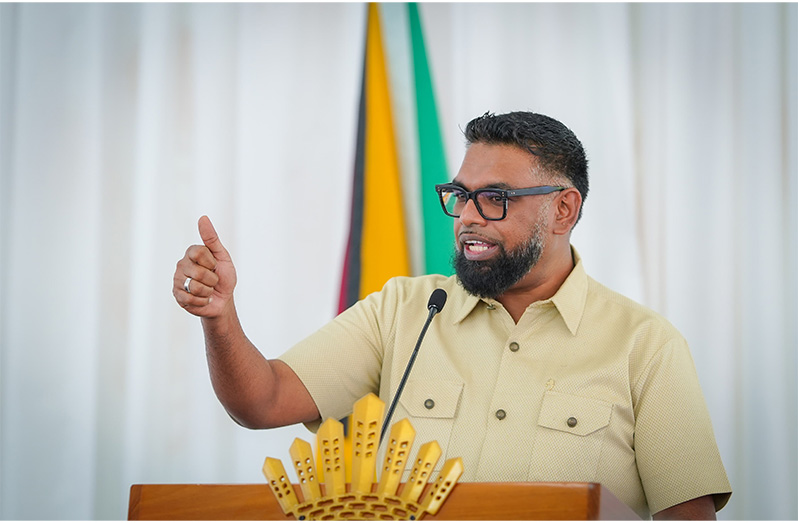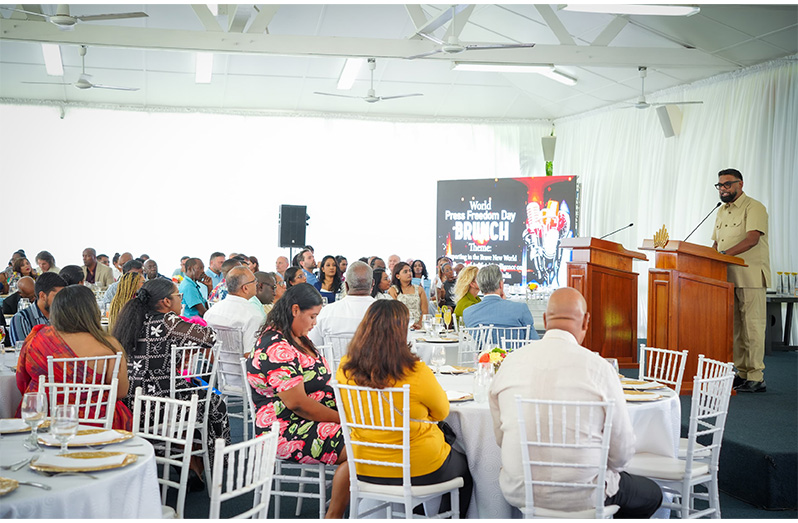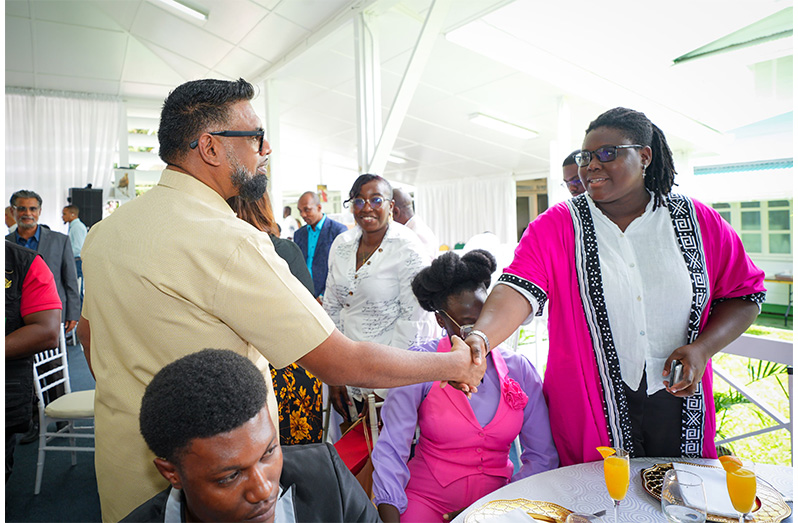–encourages fact-based journalism as use of AI rapidly grows
–urges press associations to adapt & include ‘broader disseminators of information’
AS the use of Artificial Intelligence (AI) surges globally, Guyana’s President, Dr. Irfaan Ali will soon present to his colleagues in the Caribbean Community (CARICOM) a paper that he will develop on the evolving definition of media.

Speaking to media workers at a brunch he hosted at State House on Saturday in observance of World Press Freedom Day, the Head of State spoke at length about the evolving world of media, its definition, and the role that AI plays in changing its construct. He believes that the media and even regional leaders need to adapt.
“But can you survive if you don’t adapt? These are key, key, key questions; mind-boggling questions. So, how do we ensure, in this environment of AI, that we pursue a path. And, for CARICOM, I am positioning this morning that we pursue a common path.

“Because we don’t have the capacity individually to do this, to look at the intellectual and professional conduct of AI; that would look at the challenges, threats and opportunities of AI…that would look at policies, regulations and legislations that would ensure AI does not go unchecked.
“If we don’t do it, it’s a ticking time bomb. If we don’t ensure that AI is utilised, especially when it comes to the press and information dissemination, because information is so powerful that it can destabilise instantaneously,” President Ali said.

With the global shift from traditional media already taking place, President Ali pointed out that the way leaders choose to disseminate information is now completely different.
“Many leaders today would engage the media in public; would engage the media in an environment where there are other contributors to the discussion, because leaders realise that there is power behind every instrument.
“And if you want your message not to be distorted, you have to maximise the potential of the power behind every instrument… So, media personnel will be operating in a different environment as the future evolves.
“In my humble opinion, the historic and traditional press conferences and press media room are changing rapidly. Because everyone understands the changing nature of information dissemination, of information access, of information availability,” the Head of State noted.
FACT-BASED JOURNALISM
As the definition of media changes and the use of AI surges, the President said everyone must acknowledge that the “world is at reset now”, and the question now lingers, “who constitutes the media?”
“Historically, we had a clear definition. But if the media is what gives news and information, then reach, responsibility, reliability and relevance are important. So, who is more relevant? Someone who can meet 300 million people in a second, or someone who will meet 3000 people in a day?
“Because the one who might be reaching 300 million might have reach, but are they responsible and reliable? So, how do we manage in this environment?” the President asked.
He believes there is “tremendous danger” when ethics is put on the back burner, and urged the media to stay true to fact-based journalism.
“What is the truth, and who communicates the truth? What are facts? Do facts even have a role to play anymore in this race for information? Does science even have a role anymore?
“We have to answer these questions. Because, if information disseminators themselves are not relying on facts and science, and if they’re more interested in that reach and impact and getting their force, then certain things will be sacrificed. And what we’re seeing globally is that the most important aspects of fair and ethical reporting are sacrificed.”
Noting that there is a change in the way news is now disseminated, President Ali noted that in the next 12 months, Guyana must have a clearly defined framework to include AI and digitisation in every sphere of national life.
PRESS ASSOCIATIONS
As the media landscape changes, the
President urged the various press associations to consider redefining “who are members” to include everyone who plays a role in disseminating information.
“You must also now contemplate whether the narrow, original confines of who are members must now be redefined to include the broader disseminators of information so that they can also be part of a responsible system; not doing this is not also adapting to the changing realities of our country and the world,” President Ali emphasised.
In his message to the local media, the Head of State encouraged them to report fairly, especially as the country goes to the polls later this year. “You play a crucial role in shaping public opinion, guiding conversations, and holding power accountable. This is an important year.
“The responsibility you bear is immense. And it is vital that you take it seriously. Engage in rigorous fact-checking. Pursue balanced reporting. And dedicate yourselves to the ethics of journalism. In doing so, you will not only uphold the dignity of your profession, but you will also contribute to building a more informed and cohesive society.”
World Press Freedom Day was observed under the theme, ‘Reporting in the Brave New World: The Impact of Artificial Intelligence on Press Freedom and the Media’.



.jpg)








